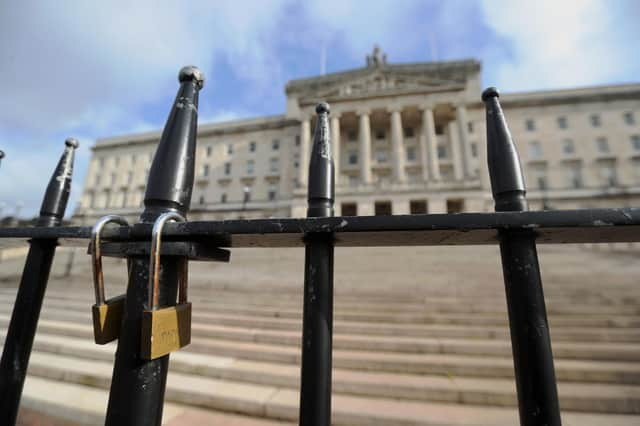Doug Beattie: This is a juncture for Northern Ireland that requires moral courage, a quality which defines leadership


While discussions around the periphery may persist, it is obvious to everyone that it is time for decision-making within the DUP.
Leadership is a demanding and, at times, isolating role that necessitates having the courage to make decisions that may not be popular.
Advertisement
Hide AdAdvertisement
Hide AdTrue leadership stands the test of time when decisions are right, even if they are not universally embraced.
The DUP now finds itself at a crossroads, facing a decision that the officers team, a group of 12 individuals, will determine based on the party leader's recommendation.
This juncture demands moral courage, a quality more vital than physical courage, as it defines true leadership.
As the leader of the Ulster Unionist Party, I would have presented the deal and my analysis to elected representatives some time ago.
Advertisement
Hide AdAdvertisement
Hide AdEach elected representative deserves to understand the situation and voice their thoughts since they would be the ones following my direction and expected to be advocating for their communities.
I would then expect to thoroughly present the plan to my party officers, outlining the risks, benefits, available courses of action, and potential outcomes.
This transparent analysis, acknowledging both positive and negative aspects, would conclude with my recommendation, seeking their support.
If the majority of my party officers could not be persuaded, my ability to convince the wider party would then be compromised.
Advertisement
Hide AdAdvertisement
Hide AdIn such a scenario, my leadership would be untenable, and I would step aside.
Facing a defining question for the party and unionism, I would bring my analysis to the party executive for their ratification.
This approach ensures that decisions are based on comprehensive and undiluted information.
This has been my approach over the past 20 months since Stormont collapsed, including the Windsor Framework and subsequent negotiations.
Advertisement
Hide AdAdvertisement
Hide AdThis process means that any decision I would take now would not come as a surprise to the party.
The DUP now faces a crucial decision, and it needs to be made without further delay.
If the decision is to restore Northern Ireland as a functional part of the United Kingdom through devolved government, I and my party will wholeheartedly support it.
Alternatively, if they choose not to restore the Assembly and Executive, attention must shift to the United Kingdom government and the Secretary of State Chris Heaton-Harris to determine the governance mechanism for Northern Ireland.
Advertisement
Hide AdAdvertisement
Hide AdRegardless of the decision, the pointless and unhelpful charade that there will be changes to the Windsor Framework in the short term must end.
There may be opportunities through the review of the Trade and Cooperation Agreement in 2025 to bring forward options that may alleviate some aspects.
From discussions, it appears that Northern Ireland may be left to drift as geopolitical issues and the general election take precedence.
My understanding from talking to the Northern Ireland Office is that governance may involve an unelected committee comprising Northern Ireland Civil Service permanent secretaries and UK government officials from various sectors.
Advertisement
Hide AdAdvertisement
Hide AdThis arrangement would be part of primary legislation at Westminster, necessitating action by the secretary of state, as the Executive Formation Bill's 18 January deadline has passed.
Northern Ireland would then be governed by an unelected committee, raising questions about influence, scrutiny, transparency, and decision-making processes.
While the outcomes may be visible, the process leading to those decisions may remain undisclosed.
There will be no joint authority between the United Kingdom government and Irish government.
Advertisement
Hide AdAdvertisement
Hide AdThis is a failed argument as the Belfast (Good Friday) Agreement does not allow for it and the government would never legislate for it.
In the same way direct rule now needs to be legislated for due to the outworking’s of the St Andrews Agreement of 2006, which says.
'The Prime Minister and the Taoiseach are determined that default by any one of the parties following the restoration of the Executive should not hinder or delay the political process in Northern Ireland.'
Through the British Irish Intergovernmental Conference, the Irish government would have a consultative role, potentially extending beyond non-devolved issues if devolution is not restored.
Advertisement
Hide AdAdvertisement
Hide AdLocal elected representatives would be kept in the dark, a situation that is obviously detrimental to the people, unionism, Northern Ireland, and our future in the United Kingdom.
Yes, the Northern Ireland Protocol was a poor negotiation, it breaks international agreement norms which should secure the sovereign territory of any nation.
The Ulster Unionist Party has made that clear since 2019 and have not changed our position.
While acknowledging the shortcomings of the Northern Ireland Protocol, it is crucial to recognise that the DUP played a role in its negotiation – they agreed the October 2 2019 first iteration of the protocol. The following year, the DUP could have said they would not accept the New Decade New Approach deal unless the cross-community consent was reinserted into the protocol. They also negotiated aspects of the Windsor Framework, including the Stormont Brake.
Advertisement
Hide AdAdvertisement
Hide AdThe purported Seven Tests are, in reality, about three tests. They all fall into each other – for example, tests 3, 5 and 6 are effectively the same. The ongoing boycott appears counterproductive.
If political courage cannot guide the DUP to the right decision, and if unionism is steered by those seeking to end devolution, the future of Northern Ireland may face its most serious challenges to date.
The Ulster Unionist Party stands firm with a clear vision: we advocate for good government, working to make Northern Ireland prosper within the United Kingdom by promoting a prosperity agenda through a transformed and sustainable economy, ultimately creating world-class public services.
• Doug Beattie MC MLA is leader of the Ulster Unionist Party